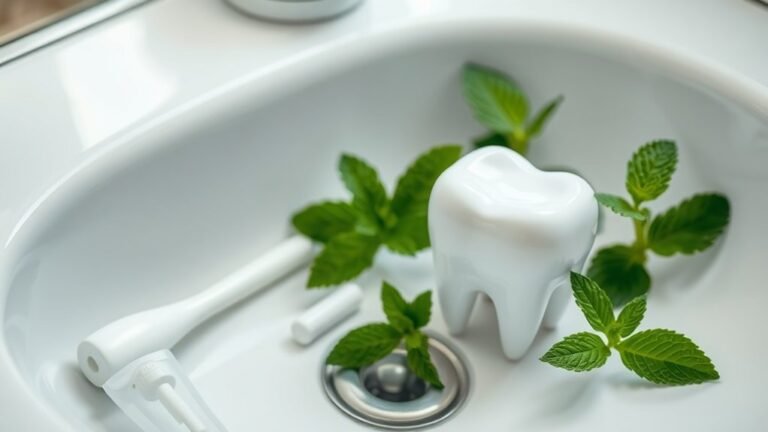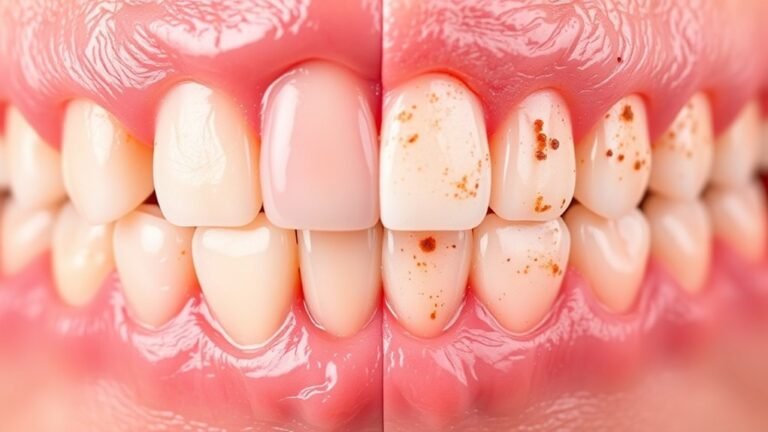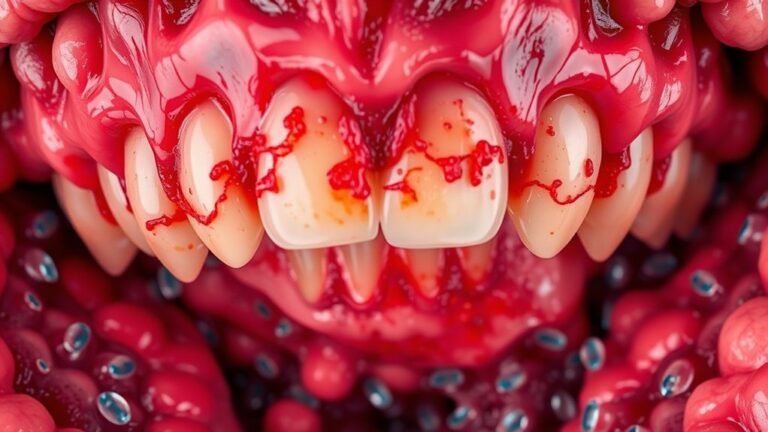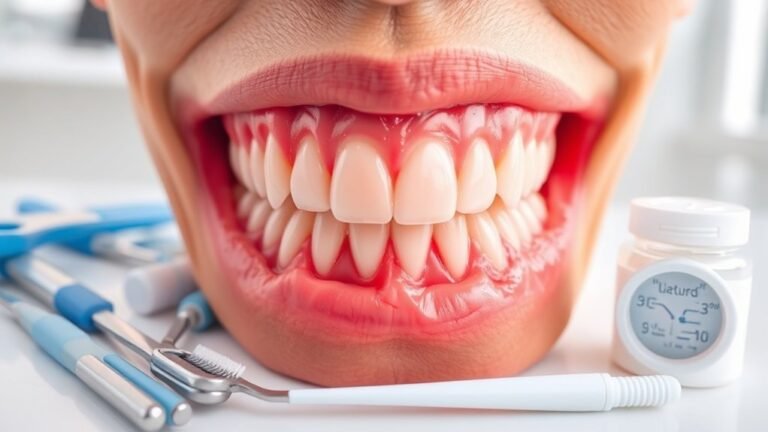What Daily Habits Improve Gum Strength and Reduce Gingival Inflammation
To improve gum strength and reduce gingival inflammation, you should adopt daily habits like brushing your teeth with a soft-bristled toothbrush at a 45-degree angle and flossing effectively to clean between your teeth. Choose fluoride toothpaste and alcohol-free mouthwash to promote gum health. Maintain a balanced diet rich in vitamins C and D, stay hydrated, and avoid tobacco products. Managing stress through relaxation techniques can also be beneficial. Continue exploring ways to enhance your gum health further.
Key Takeaways
- Brush teeth gently at a 45-degree angle to the gum line for effective cleaning and reduced irritation.
- Floss daily using a C-shape technique to remove plaque and food particles from below the gumline.
- Maintain a balanced diet rich in vitamins C and D to strengthen gum tissue and reduce inflammation.
- Stay hydrated by drinking at least eight glasses of water daily to support saliva production and gum health.
- Manage stress through mindfulness and adequate sleep to strengthen the immune system and promote gum healing.
Understanding Gum Health and Its Importance
Understanding gum health is vital because it plays a key role in your overall oral hygiene and well-being. Healthy gums support your teeth, preventing tooth loss and reducing the risk of systemic health issues. Neglecting gum health can lead to gingival inflammation, which is the body’s response to bacteria in plaque. This inflammation can progress to periodontal disease, causing deeper tissue damage and potential bone loss. Regular monitoring of your gum condition, along with proactive dental care, is essential in maintaining ideal gum health. You should look for symptoms such as redness, swelling, or bleeding during brushing. By prioritizing your gum health, you can greatly enhance both your oral hygiene and overall health, minimizing the impact of gingival inflammation on your life.
The Role of Proper Brushing Techniques
Choosing the right toothbrush is essential for effective gum care, as bristle type and brush size can greatly impact your oral hygiene. Additionally, employing the correct brushing motion helps remove plaque without damaging your gums. By mastering these techniques, you can enhance your gum health and overall dental well-being.
Choosing the Right Brush
While many people focus on toothpaste and mouthwash, the toothbrush you select plays a crucial role in maintaining gum health. Choosing a brush that suits your needs can greatly impact oral hygiene and reduce gum irritation. Here’s a quick comparison to help you decide:
| Brush Type | Benefits |
|---|---|
| Soft Bristle | Gentle on gums, reduces irritation |
| Medium Bristle | Effective for plaque removal |
| Electric Toothbrush | Consistent pressure, often more effective |
A soft-bristled brush is generally recommended for those prone to gum irritation, while an electric toothbrush can help guarantee proper technique. Selecting the right brush complements your daily routine and promotes healthier gums.
Effective Brushing Motion
To maintain ideal gum health, employing the right brushing technique is essential. An effective brushing motion involves using short, gentle strokes at a 45-degree angle to your gum line. This technique helps dislodge plaque and food particles without causing damage to your gums. Always brush the outer, inner, and chewing surfaces of each tooth, ensuring you spend at least two minutes total. Don’t forget to gently brush your tongue, as it also harbors bacteria that can contribute to gingivitis. Remember to replace your toothbrush every three to four months, or sooner if the bristles fray. Consistency in your brushing routine, combined with the right technique, will greatly enhance gum strength and reduce the risk of gingival inflammation.
Flossing: A Key to Gum Care
Flossing is essential for maintaining gum health, as it removes plaque and food particles from areas your toothbrush can’t reach. To maximize its benefits, you’ll need to understand effective techniques, establish a consistent frequency, and choose the right type of floss. Let’s explore these critical aspects to enhance your gum care routine.
Flossing Techniques Explained
Effective flossing techniques are essential for maintaining gum health, as they help remove plaque and food particles that a toothbrush can’t reach. Start with about 18 inches of dental floss, wrapping the ends around your middle fingers, leaving a few inches to work with. Gently slide the floss between your teeth, curving it around each tooth in a C-shape. This method effectively cleans below the gumline, vital in reducing gum inflammation. Use a fresh section of floss for each tooth to avoid transferring bacteria. Remember not to snap the floss, as this can damage your gums. Consistent, proper flossing can greatly enhance your gum health and prevent periodontal issues.
Frequency and Timing Matters
While you might think that occasional flossing is sufficient, establishing a consistent schedule is essential for ideal gum health. Daily habits, such as regular flossing, play a vital role in managing your oral microbiome and reducing gingival inflammation. Aim to floss at least once a day, preferably before bedtime, to effectively remove food particles and plaque buildup. This practice not only strengthens your gums but also promotes a balanced oral microbiome.
| Timing | Benefits |
|---|---|
| Morning Routine | Prepares gums for the day ahead |
| Before Bed | Reduces overnight bacterial growth |
| After Meals | Minimizes plaque formation |
| Weekly Check | Assesses gum health over time |
Regular flossing can greatly improve your gum strength and overall oral health.
Choosing the Right Floss
How do you choose the right floss for ideal gum care? Start by evaluating your gum sensitivity and any issues with bleeding gums. If your gums are sensitive, opt for waxed floss, which glides easily between teeth, reducing friction and discomfort. For tighter spaces, consider using dental tape or super floss, designed to expand and conform to your teeth. Look for options with antimicrobial properties to further reduce inflammation and bacteria. If you struggle with dexterity, a floss holder or water flosser can be beneficial. Remember, the right floss not only helps remove plaque but also promotes healthier gums, minimizing the risk of inflammation. Regular use of appropriate floss will lead to stronger, healthier gums.
Choosing the Right Toothpaste and Mouthwash
Selecting the right toothpaste and mouthwash is essential for maintaining ideal gum health. Look for toothpaste containing fluoride, as it effectively combats tooth decay by remineralizing enamel. Additionally, choose formulas that include oral probiotics, which can help balance your oral microbiome and reduce harmful bacteria associated with gum disease.
When selecting mouthwash, opt for an alcohol-free option to avoid drying out your mouth, which can exacerbate gum inflammation. Look for antibacterial ingredients like chlorhexidine or cetylpyridinium chloride, as they can help reduce plaque buildup and gingival irritation.
The Impact of Diet on Gum Strength
The health of your gums is greatly influenced by your diet, as the nutrients you consume play an essential role in maintaining gum strength and overall oral health. A diet rich in vitamins, particularly vitamin C and vitamin D, is vital for promoting healthy gum tissue. Vitamin C aids in collagen production, which strengthens the connective tissue in your gums, reducing inflammation and promoting healing. Additionally, vitamin D supports immune function, helping your body combat bacteria that may cause gum disease. Incorporating foods such as citrus fruits, leafy greens, and fatty fish can enhance your gum health. Avoiding excessive sugar and processed foods also protects against inflammation and deterioration of gum tissue, fostering a robust environment for your oral health.
Staying Hydrated for Healthy Gums
Staying hydrated is important for maintaining healthy gums, as water plays a key role in oral health. Proper hydration helps wash away food particles and bacteria, reducing the risk of gum disease. To support your gum health, it’s necessary to incorporate effective strategies for staying hydrated throughout the day.
Importance of Water Intake
Water plays an essential role in maintaining healthy gums by facilitating proper hydration and supporting overall oral health. Staying adequately hydrated helps control inflammation and reduces gum swelling, which are critical for preventing periodontal disease. Adequate water intake also aids in the production of saliva, which neutralizes acids and washes away food particles and bacteria.
| Benefit | Effect on Gums | Importance |
|---|---|---|
| Reduces Inflammation | Controls gum swelling | Prevents periodontal disease |
| Enhances Saliva Production | Aids in oral cleansing | Maintains pH balance |
| Promotes Healing | Supports gum tissue recovery | Enhances gum health |
Incorporating sufficient water into your daily routine is essential for sustaining gum strength and promoting ideal oral health.
Hydration and Oral Health
Maintaining hydration is essential for ideal gum health, as it directly impacts various oral functions. Proper hydration helps maintain saliva production, which is vital for gum healing and overall oral health. Saliva acts as a natural defense, washing away food particles and neutralizing harmful acids that can lead to inflammation. When you’re well-hydrated, your body can effectively deliver essential nutrients to your gums, promoting healing and reducing the risk of gingivitis or periodontal disease. Dehydration, on the other hand, can lead to dry mouth, increasing plaque buildup and exacerbating gum issues. By prioritizing hydration, you not only support your gums but also enhance your overall oral health, creating a healthier environment for your teeth and gums to thrive.
Tips for Staying Hydrated
To keep your gums healthy, aim for at least eight glasses of fluids each day. Staying hydrated can help alleviate gum pain and reduce gingival inflammation. Here are some tips to guarantee you’re drinking enough fluids:
| Beverage Type | Benefits |
|---|---|
| Water | Essential for hydration |
| Herbal Teas | Anti-inflammatory properties |
| Coconut Water | Natural electrolytes |
| Broth-Based Soups | Hydrating and nutrient-rich |
Incorporating herbal remedies like chamomile or peppermint tea can also support gum health. Remember to sip water throughout the day, especially after meals, to wash away food particles and bacteria. By prioritizing hydration, you’re actively contributing to the strength of your gums and overall oral health.
Avoiding Tobacco Products
While many people may underestimate the impact of tobacco on oral health, avoiding tobacco products is essential for maintaining healthy gums. Tobacco use greatly weakens gum strength and increases the risk of periodontal disease. By quitting or avoiding these products, you can enhance your oral health. Consider the following benefits:
- Reduces the risk of gum disease
- Enhances blood flow to the gums
- Promotes healing of oral tissues
- Decreases inflammation and irritation
- Improves overall oral hygiene
These changes contribute to stronger gums and a healthier mouth. Prioritizing your gum health by steering clear of tobacco can lead to better long-term outcomes and a reduced risk of serious dental issues. Make the choice to protect your smile!
Managing Stress for Better Oral Health
Stress can greatly impact your oral health, leading to issues such as gum disease and teeth grinding. When you’re stressed, your body releases cortisol, which can weaken your immune system and make it harder to fight off infections, including gum disease. Managing stress effectively can markedly improve your oral health. Techniques like mindfulness, yoga, and regular exercise can reduce stress levels and promote relaxation. Additionally, ensuring you get enough sleep rejuvenates your immune system, allowing your body to better respond to oral health challenges. Incorporating these practices into your daily routine not only benefits your mental well-being but also strengthens your gums and overall oral health, helping you maintain a healthy smile.
The Benefits of Regular Dental Check-ups
Regular dental check-ups are essential for maintaining ideal gum health, as they allow for early detection and treatment of potential issues before they escalate. By scheduling these appointments, you’re taking a proactive approach to your oral health, greatly reducing the risk of gum infection and other complications. Here are some key benefits:
- Early detection of gum disease and other oral health issues
- Professional cleaning to remove plaque and tartar buildup
- Tailored advice on improving your daily oral hygiene routine
- Monitoring of existing conditions, ensuring timely intervention
- Peace of mind knowing that your gums and teeth are assessed regularly
Incorporating regular dental check-ups into your routine can lead to stronger gums and overall better health.
Incorporating Gum-Strengthening Exercises
To enhance your gum health, incorporating specific exercises into your daily routine can be highly beneficial. Start by practicing gum massages; use your fingers to gently stimulate the gums in a circular motion. This increases blood circulation and promotes healing. Additionally, consider jaw exercises, like chewing sugar-free gum, which can strengthen the gum tissue. While brushing your teeth, make sure you’re using the correct technique—brush in soft, circular motions to prevent gum recession. Pair these exercises with your regular dental care routine for the best results. Consistency is key; aim to perform these exercises daily. Over time, you’ll likely notice improved gum strength and reduced inflammation, contributing to overall oral health.
Frequently Asked Questions
Can Herbal Remedies Enhance Gum Strength and Reduce Inflammation?
Yes, herbal remedies can enhance gum strength and reduce inflammation. Ingredients like chamomile, aloe vera, and green tea possess anti-inflammatory properties that promote gum health. You should consider incorporating these into your daily oral care routine.
How Does Sleep Quality Impact Gum Health?
Sleep considerably strengthens your gums. When you rest well, your body’s healing hormones increase, promoting repair and reducing inflammation. Prioritizing peaceful sleep helps maintain your oral health, ensuring gums stay strong and resilient.
Are There Specific Vitamins for Gum Strengthening?
Yes, vitamins C and D are essential for gum strengthening. Vitamin C aids collagen production, while vitamin D supports immune function, helping maintain gum health. Make certain you’re getting enough through diet or supplements for the best gum strength.
Can Mouth Breathing Affect Gum Inflammation?
Yes, mouth breathing can worsen gum inflammation. It dries out your oral tissues, reducing saliva’s protective effects, which may lead to increased bacteria and plaque buildup, ultimately exacerbating inflammation and compromising gum health.
What Role Does Genetics Play in Gum Health?
You can’t choose your genes, but they greatly influence your gum health. Genetic predispositions can affect inflammation and susceptibility to periodontal disease, making regular dental care essential for maintaining your gum strength and overall oral health.
Conclusion
Incorporating these daily habits can greatly enhance your gum strength and reduce inflammation. By prioritizing proper brushing, flossing, and a healthy diet, you’re actively investing in your oral health. Remember, avoiding tobacco and managing stress are just as essential. Regular dental check-ups guarantee potential issues are addressed early. So, why not take charge of your gum health today? With these practices, you can enjoy a healthier smile and prevent future complications. Your gums deserve it!






